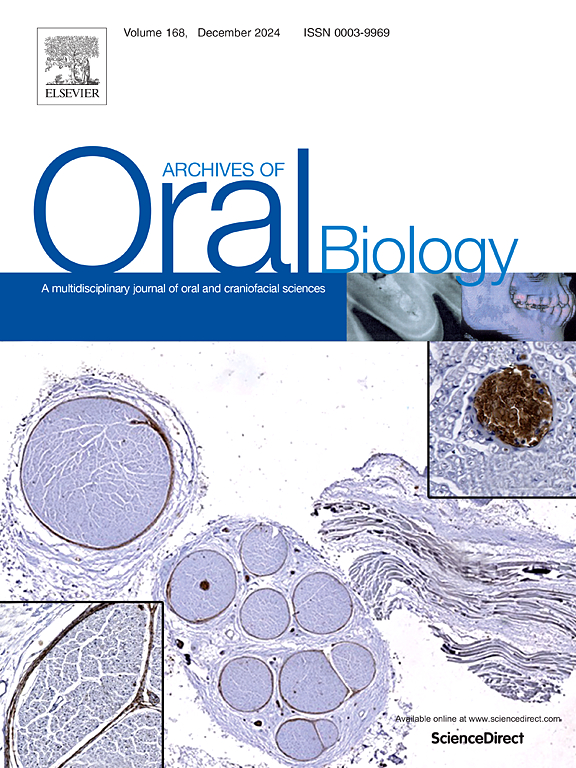瘤内树突状细胞接种加放化疗对诱导的仓鼠口腔鳞状细胞癌的影响
IF 2.1
4区 医学
Q2 DENTISTRY, ORAL SURGERY & MEDICINE
引用次数: 0
摘要
目的口腔鳞状细胞癌发病率不断上升,死亡率居高不下,是一个重要的健康问题。传统的治疗方法仍然是手术和放化疗,这些方法在治疗复发和转移性癌症并伴有多种并发症方面取得的成功有限。使用树突状细胞疫苗接种的免疫治疗是一种相当新颖的方法,然而,在根除口腔鳞状细胞癌方面显示出有限的治疗效果,因为后者以其免疫抑制微环境而闻名。因此,迫切需要采用新的多模式方法,以增强树突状细胞疫苗的抗肿瘤作用,减少副作用,避免复发。设计建立7,12-二甲基苯[a]蒽化学诱导的仓鼠颊袋口腔鳞状细胞癌模型。临床上明显的肿瘤块75% %手术切除。切除肿瘤后制备树突状细胞疫苗。将动物分为3组,分别采用不同的治疗方法。结果减容手术、放化疗和瘤内树突状细胞疫苗联合治疗可显著延缓肿瘤生长,诱导肿瘤完全消退。此外,这种方式与最高存活率(89 %)和免疫记忆的建立有关。结论我们的研究结果强调了通过辅助放化疗改善术后环境对产生强大的抗肿瘤免疫活性的重要性。放化疗和树突状细胞疫苗可用于临床使用/试验,这使该方法具有潜在的临床应用价值。本文章由计算机程序翻译,如有差异,请以英文原文为准。
Effect of intratumor dendritic cell vaccination with and without chemoradiation in induced oral squamous cell carcinoma of hamsters
Objectives
Oral squamous cell carcinoma represents an important health problem since its increasing incidence and persistent high mortality rates. The traditional therapies remain surgery and chemoradiation which have shown limited success in treating recurrent and metastatic cancers with multiple complications. Immunotherapy using dendritic cell vaccination is a rather novel approach that, yet, showed limited therapeutic efficacy in eradicating oral squamous cell carcinoma since the latter is known for its immunosuppressive microenvironment. Hence, there is pressing demand for adopting new multimodality approaches that would augment the antitumor effect of dendritic cell vaccine with lesser side effects and no relapse.
Design
Chemically induced oral squamous cell carcinoma model of hamster buccal pouch using 7,12-Dimethylbenz[a]anthracene was established. The clinically evident tumor masses were then 75 % surgically debulked. Resected tumors were manipulated to prepare dendritic cell vaccine. Animals were divided into 3 groups and subsequently subjected to different treatment approaches.
Results
The combination therapy of debulking surgery, chemoradiation, and intratumor dendritic cell vaccination significantly delayed tumor growth with complete regression of induced tumors. Moreover, this modality was associated with the highest survival rate (89 %) with establishment of immunological memory.
Conclusions
Our findings emphasize the importance of modifying post-surgical environment, via co-administration of adjuvant chemoradiation, in generating robust anti-tumor immunologic activity. Chemoradiation and dendritic cell vaccines are available for clinical use/trial which endows this approach the merit of potential clinical application.
求助全文
通过发布文献求助,成功后即可免费获取论文全文。
去求助
来源期刊

Archives of oral biology
医学-牙科与口腔外科
CiteScore
5.10
自引率
3.30%
发文量
177
审稿时长
26 days
期刊介绍:
Archives of Oral Biology is an international journal which aims to publish papers of the highest scientific quality in the oral and craniofacial sciences. The journal is particularly interested in research which advances knowledge in the mechanisms of craniofacial development and disease, including:
Cell and molecular biology
Molecular genetics
Immunology
Pathogenesis
Cellular microbiology
Embryology
Syndromology
Forensic dentistry
 求助内容:
求助内容: 应助结果提醒方式:
应助结果提醒方式:


